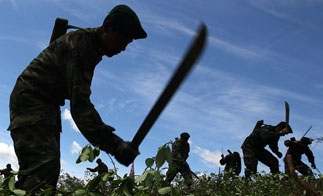Bolivia announced it will create a new ecological unit in the armed forces to protect the country’s national parks from the spread of coca cultivation.
On August 6, President Evo Morales announced that the Bolivian military’s first “Ecological Regiment” would be created to protect the country’s national parks, particularly from the spread of coca cultivation into these areas, reported La Razon. It is illegal to grow coca in any of Bolivia’s ecological reserves.
Morales singled out Carrasco and Isiboro National Parks, warning coca growers in these regions to respect the cultivation limits imposed on them. The government began a drive to eradicate all the coca in Carrasco in late May, announcing last month that all the coca they had discovered, 354 hectares, had been destroyed.
InSight Crime Analysis
A June report by La Opinion found that coca cultivation in Carrasco National Park was contributing to the destruction of flora and faunca in the area, with coca growers felling trees over some 500 hectares in order to grow coca.
The introduction of a military unit to protect against this is therefore welcome, though it will have an enormous task on its hands. Based on the UN Office on Drugs and Crime’s 2010 report on Bolivian coca cultivation, Carrasco and Isiboro account for around 2,200 hectares of the country’s total cultivation. What’s more, some fear that a planned highway set to run through Isiboro National Park will damage fragile ecosystems while literally paving the way for further coca cultivation in the region.
The government declared in January that it plans to eradicate all coca grown illegally in the country, a total of some 10,000 hectares. Under the current law, a maximum of 20,000 hectares is allowed to be grown for traditional uses.
Nicaragua launched a similar “eco-batallion” unit in January, which has succeeded in cracking down on illegal logging in the country.

